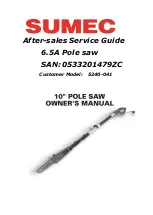
31 ENGLISH
Cutting crown and cove moldings
Crown and cove moldings can be cut on a compound
miter saw with the moldings laid flat on the turn base.
There are two common types of crown moldings and
one type of cove moldings; 52/38° wall angle crown
molding, 45° wall angle crown molding and 45° wall
angle cove molding.
►
Fig.54:
1.
52/38° type crown molding
2.
45° type
crown molding
3.
45° type cove molding
There are crown and cove molding joints which are
made to fit "Inside" 90° corners ((a) and (b) in the figure)
and "Outside" 90° corners ((c) and (d) in the figure.)
(a) (b)
(c) (d)
1
2
1.
Inside corner
2.
Outside corner
2
(a)
(b)
(a)
(b)
(b)
(a)
(b)
(a)
(a)
(b)
(c)
(d)
1
1.
Inside corner
2.
Outside corner
Measuring
Measure the wall width, and adjust the width of the
workpiece according to it. Always make sure that width
of the workpiece's wall contact edge is the same as wall
length.
►
Fig.55:
1.
Workpiece
2.
Wall width
3.
Width of the
workpiece
4.
Wall contact edge
Always use several pieces for test cuts to check the
saw angles.
When cutting crown and cove moldings, set the bevel
angle and miter angle as indicated in the table (A) and
position the moldings on the top surface of the saw
base as indicated in the table (B).
In the case of left bevel cut
(a) (b)
(c) (d)
1
2
1.
Inside corner
2.
Outside corner
Table (A)
–
Molding
position
in the
figure
Bevel angle
Miter angle
52/38°
type
45° type
52/38°
type
45° type
For
inside
corner
(a)
Left
33.9°
Left 30°
Right
31.6°
Right
35.3°
(b)
Left
31.6°
Left
35.3°
For
outside
corner
(c)
(d)
Right
31.6°
Right
35.3°
Table (B)
–
Molding
position in
the figure
Molding
edge against
guide fence
Finished
piece
For inside
corner
(a)
Ceiling
contact edge
should be
against guide
fence.
Finished
piece will be
on the Left
side of blade.
(b)
Wall contact
edge should
be against
guide fence.
For outside
corner
(c)
Finished
piece will be
on the Right
side of blade.
(d)
Ceiling
contact edge
should be
against guide
fence.
Example:
In the case of cutting 52/38° type crown molding for
position (a) in the above figure:
•
Tilt and secure bevel angle setting to 33.9° LEFT.
•
Adjust and secure miter angle setting to 31.6°
RIGHT.
•
Lay crown molding with its broad back (hidden)
surface down on the turn base with its CEILING
CONTACT EDGE against the guide fence on the
saw.
•
The finished piece to be used will always be on
the LEFT side of the blade after the cut has been
made.
Summary of Contents for DLS212
Page 2: ...Fig 1 17 18 19 20 1 2 3 4 5 6 7 8 9 10 11 12 13 14 15 16 21 22 23 Fig 2 2 ...
Page 3: ...5 6 7 9 8 10 10 11 12 13 14 1 2 3 4 15 16 17 18 19 20 21 Fig 3 2 1 Fig 4 1 2 4 3 4 Fig 5 3 ...
Page 4: ...1 2 Fig 6 2 1 3 Fig 7 1 Fig 8 1 3 2 Fig 9 1 2 1 Fig 10 1 2 Fig 11 1 Fig 12 4 ...
Page 5: ...1 Fig 13 3 1 2 Fig 14 1 Fig 15 1 2 3 4 6 5 Fig 16 1 Fig 17 1 Fig 18 5 ...
Page 6: ...1 3 2 Fig 19 1 2 Fig 20 1 3 2 4 Fig 21 1 Fig 22 1 Fig 23 6 ...
Page 7: ...1 2 Fig 24 1 Fig 25 1 Fig 26 1 Fig 27 3 2 1 Fig 28 3 2 1 Fig 29 1 Fig 30 7 ...
Page 8: ...1 Fig 31 A B Fig 32 1 Fig 33 3 1 2 Fig 34 3 1 2 Fig 35 8 ...
Page 9: ...1 3 2 4 5 Fig 36 1 2 Fig 37 1 2 3 4 5 6 Fig 38 1 3 2 Fig 39 1 2 Fig 40 1 Fig 41 9 ...
Page 11: ...2 1 Fig 48 1 2 3 Fig 49 1 Fig 50 1 Fig 51 Fig 52 11 ...
Page 12: ...1 2 3 Fig 53 1 2 3 Fig 54 2 3 1 4 Fig 55 2 3 4 1 Fig 56 1 3 4 2 Fig 57 1 2 Fig 58 12 ...
Page 14: ...Fig 66 1 Fig 67 1 3 4 2 Fig 68 3 1 2 Fig 69 1 Fig 70 14 ...
Page 15: ...1 2 1 2 Fig 71 Fig 72 1 Fig 73 1 2 Fig 74 1 Fig 75 1 Fig 76 15 ...
Page 16: ...1 2 1 2 Fig 77 3 2 1 2 Fig 78 1 Fig 79 1 2 Fig 80 1 2 3 Fig 81 Fig 82 16 ...
Page 17: ...1 2 Fig 83 3 4 2 4 1 Fig 84 4 1 2 3 5 Fig 85 5 1 2 3 4 Fig 86 1 2 Fig 87 17 ...
Page 207: ...207 ...
















































